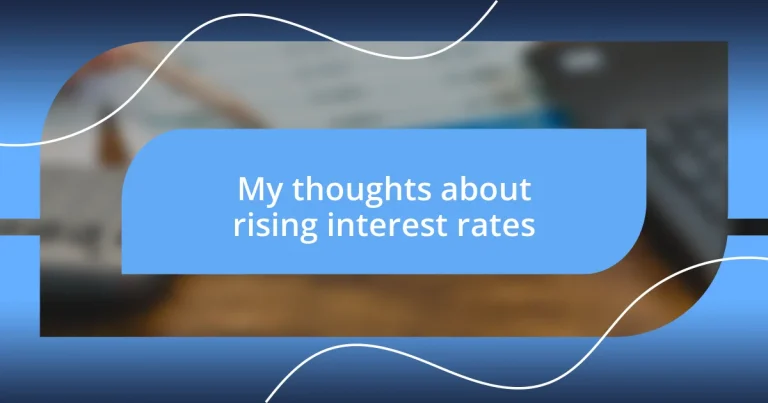Key takeaways:
- Rising interest rates significantly impact personal finance, leading to increased borrowing costs, changes in spending behavior, and heightened emotional stress.
- Effective debt management strategies, such as budgeting and consolidating debts, can alleviate financial burdens during times of rising rates.
- Investors should remain adaptable to interest rate changes, as they can affect asset valuations and present unique opportunities in markets like real estate.
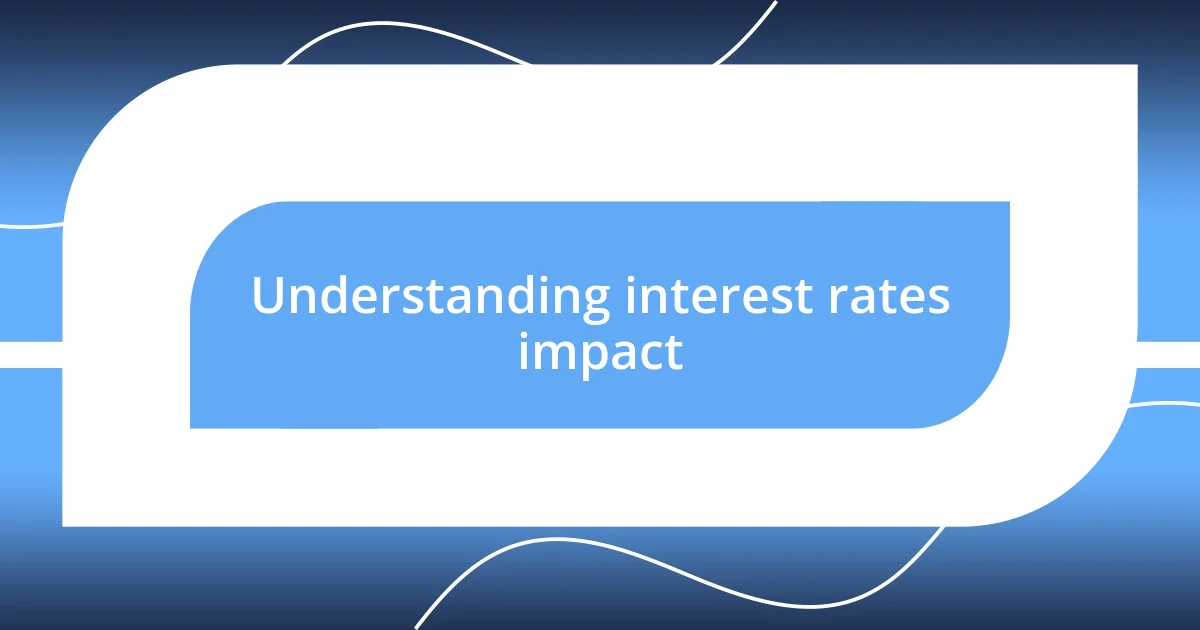
Understanding interest rates impact
Rising interest rates can feel like a weight on your shoulders, especially when the cost of borrowing increases. I remember when I was looking to buy my first home; every percentage point felt like it added an extra layer of financial stress. It makes you wonder, how many dreams are put on hold just because of a shift in these rates?
When interest rates rise, it’s not just about the immediate financial implications. I often think about how it affects everyday people—like the small business owner who suddenly finds it harder to secure a loan for expansion. You can almost feel the tension in the air as decisions around growth get postponed, which can have a ripple effect on the economy.
It’s also crucial to consider the emotional impact of these financial shifts. Imagine someone saving for a family vacation; higher rates might mean they need to cut back. It’s easy to overlook how numbers on a spreadsheet translate into real-world feelings of anxiety and uncertainty. Have you ever had to rethink a plan because of rising rates? That kind of contemplation often shifts priorities in ways we don’t anticipate.
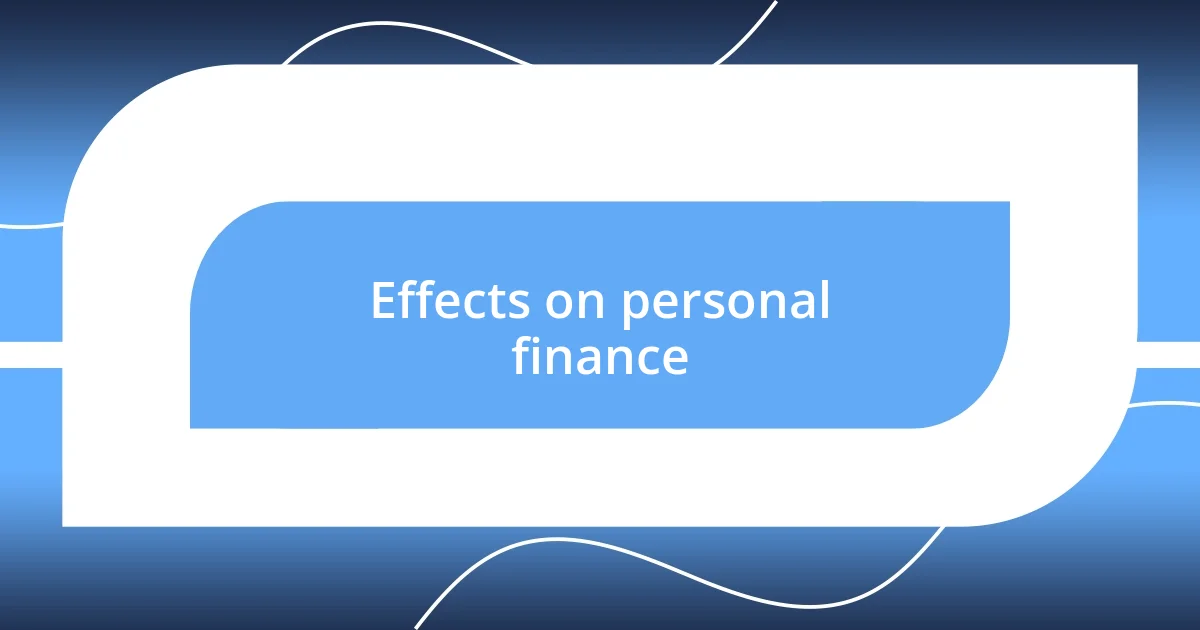
Effects on personal finance
As interest rates climb, the impact on personal finance can be quite profound. I recall attempting to refinance my student loans a few years ago. The prospect of lower monthly payments was exhilarating until I realized that rising rates meant I’d have to pay more in interest over time. It’s a frustrating reminder that every decision comes with its own set of financial consequences.
When the cost of borrowing increases, many individuals may rethink their spending habits. For instance, I once delayed purchasing a new car because I didn’t want to finance it at a higher rate. This cautious decision echoed broader considerations about my budget and lifestyle. It’s interesting how a single percentage point can influence our choices—forcing us to balance between desires and the pragmatic reality of our finances.
Moreover, the emotional side of managing personal finances during these times can’t be understated. I’ve felt the twinge of anxiety when calculating my budget with rising interest rates in mind. It makes saving for big goals feel even more daunting. Have you ever felt that pressure? Juggling priorities becomes a regular mental exercise, as each financial decision influences how secure or vulnerable we feel about our future.
| Aspect | Rising Interest Rates Impact |
|---|---|
| Borrowing Costs | Increases, leading to higher monthly payments for loans and credit cards. |
| Savings Growth | May encourage higher savings rates but often doesn’t compensate for loan costs. |
| Spending Behavior | Individuals tend to cut back on discretionary spending and may delay major purchases. |
| Emotional Impact | Increased anxiety about finances and long-term goals. |
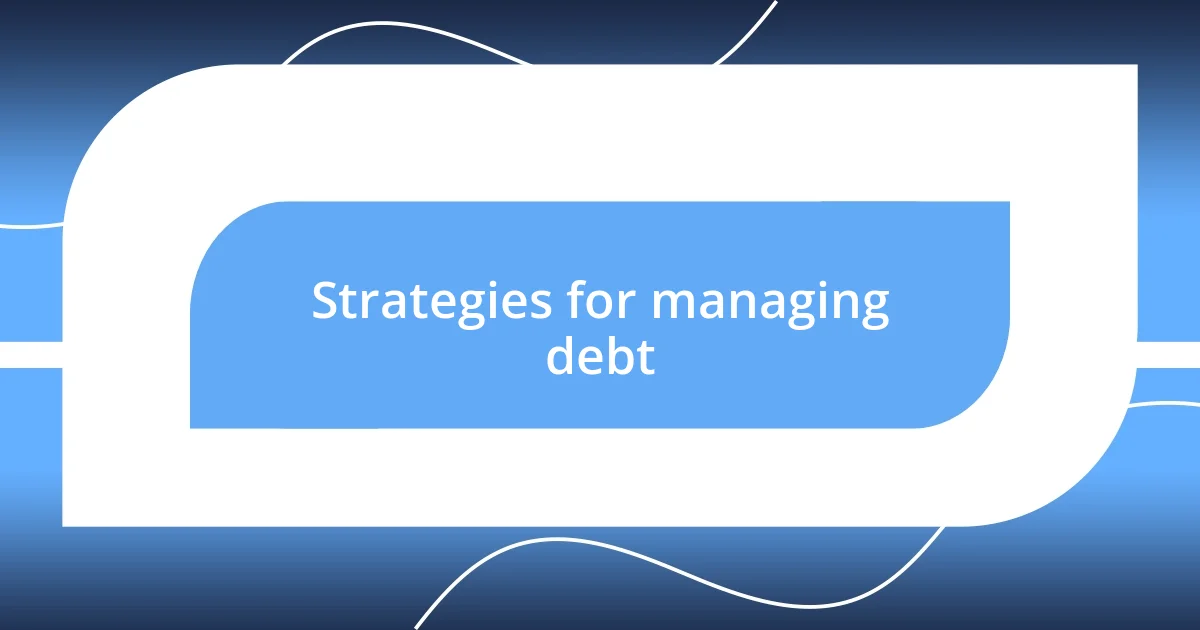
Strategies for managing debt
Managing debt effectively during times of rising interest rates is essential. I’ve found that prioritizing and organizing debt can make a world of difference. A few years back, I created a detailed plan that helped me methodically address my debts, which felt overwhelming at first. This strategic focus allowed me to chip away at my obligations despite higher interest costs.
Here are some strategies to consider:
- Create a Budget: Analyze your income and expenses to identify areas where you can cut back.
- Consider Debt Snowball or Avalanche Methods: Focus on paying off the smallest balance first or the debt with the highest interest rate, respectively, to build momentum.
- Consolidate Debts: Look into consolidating loans to potentially secure a lower interest rate.
- Negotiate with Lenders: Don’t hesitate to reach out and discuss your situation; they may offer more favorable terms.
Finding the right strategy can sometimes ease the emotional burden, too. I remember feeling a sense of relief as I tracked my progress, and it kept me motivated. Each small victory ignited a spark of hope that I could overcome the challenge and regain control over my finances.
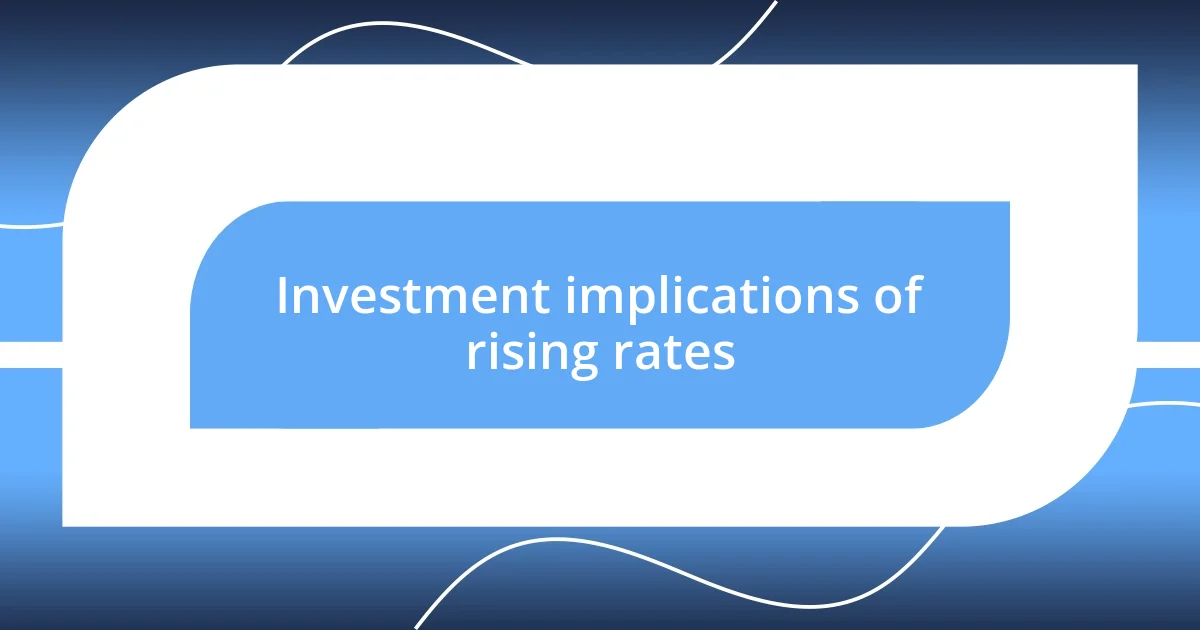
Investment implications of rising rates
The implications of rising interest rates on investment can be significant. When rates go up, the cost of borrowing for investments rises, which can deter both individuals and businesses from pursuing growth opportunities. I remember hesitating to take out a loan for real estate development during a rate hike; it felt like I was weighing my passion against immediate financial realities. Have you ever faced a similar choice where timing made all the difference?
Moreover, higher interest rates typically lead to a decline in bond prices. I saw this firsthand when the bonds I held started to drop in value, leaving me to question my portfolio strategy. This experience taught me the importance of diversification—keeping assets spread across various investments to mitigate risk. In times like these, I often remind myself to consider looking at sectors that may thrive despite rising rates, like utilities or consumer staples.
Lastly, I’ve noticed that rising rates influence stock market behavior. Investors often seek companies with stable earnings and strong fundamentals, as growth stocks may experience increased volatility. I recall adjusting my stock choices during a previous rate increase, opting for more defensively positioned companies to shield myself from potential downturns. This strategy not only provided me with some financial peace but also reinforced the principle that adapting to market conditions is essential for long-term success.
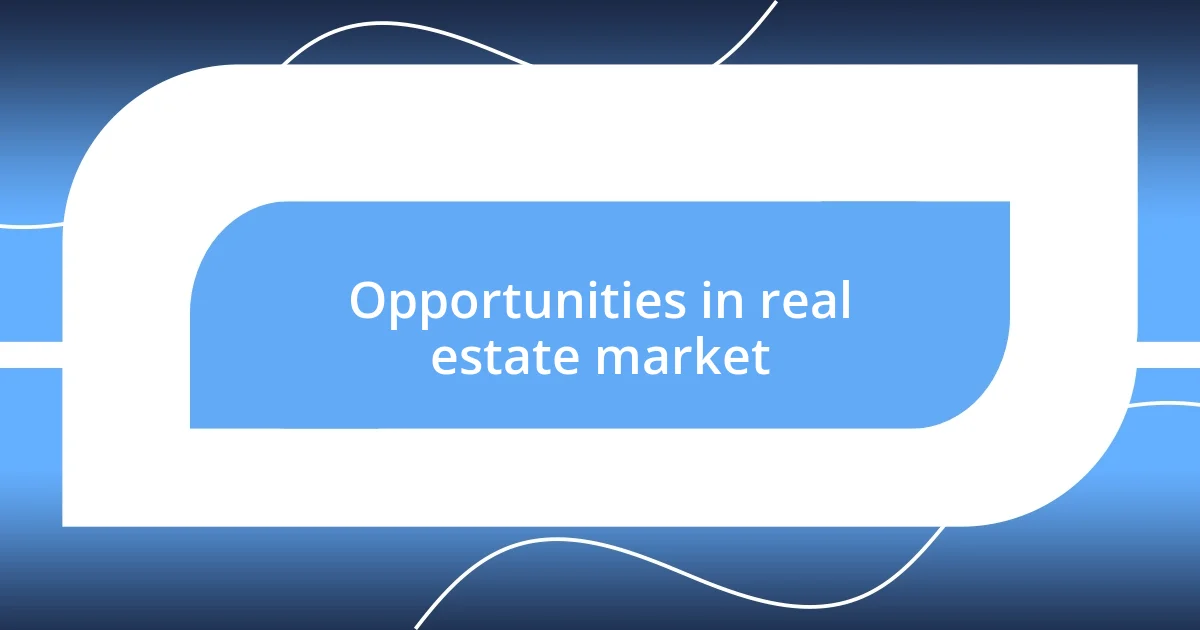
Opportunities in real estate market
The real estate market can actually present unique opportunities during periods of rising interest rates. When I first experienced increasing rates, I noticed a shift in buyer sentiment; many potential homeowners paused their searches, which meant less competition for those who were ready to buy. Have you ever contemplated how waiting for the ‘perfect’ moment can sometimes keep you from seizing what’s available now? I can tell you firsthand that diving into the market during such times often leads to incredible deals, especially on properties that sellers are eager to unload.
Additionally, while some investors may be pulling back on new purchases, this can create favorable conditions for those with cash or better financing options. I once capitalized on a situation where a property sat unsold because the owner faced rising costs and needed to sell quickly. This allowed me to negotiate a price below market value, which felt like a little victory in the face of uncertainty. It reminded me that every challenge carries an opportunity—it’s all about staying alert and ready to act.
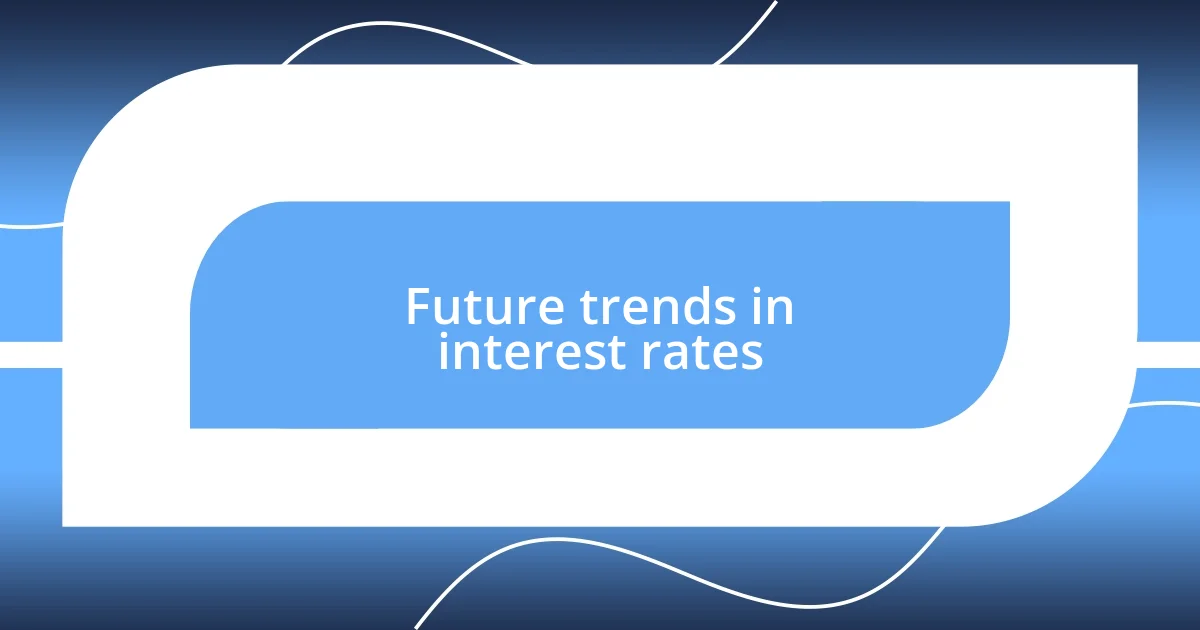
Future trends in interest rates
As I look ahead at the future trends in interest rates, I sense a mixed bag of possibilities. While some analysts predict a gradual increase, which could signal a return to normalcy after a prolonged low-rate environment, I’ve learned that these projections often come with caveats. I remember a time when rates were forecasted to rise, and yet, external factors like inflation and geopolitical tensions caused unexpected fluctuations. Doesn’t it make you wonder how many variables are truly at play?
From my perspective, central banks will continue to tread carefully, balancing the need to curb inflation against the risk of stalling economic growth. I’ve seen how responsiveness to economic indicators plays a critical role; it’s like a delicate dance. For instance, when I observed how quickly the Federal Reserve responded during past economic downturns, I realized that we have to stay agile in our strategies as investors. This brings up an interesting question: how prepared are you to pivot your plans based on these ever-changing conditions?
The impact of evolving interest rates on consumer behavior will likely intensify. I recall a time when I adjusted my spending habits as rates climbed, consciously saving more instead of making bigger purchases. This shift can be quite nuanced, as people weigh their financial moves more carefully. Have you ever felt that hesitance in your own financial decisions? It’s a crucial moment that can define investment strategies and spending habits, making awareness of these trends essential in navigating the coming years.
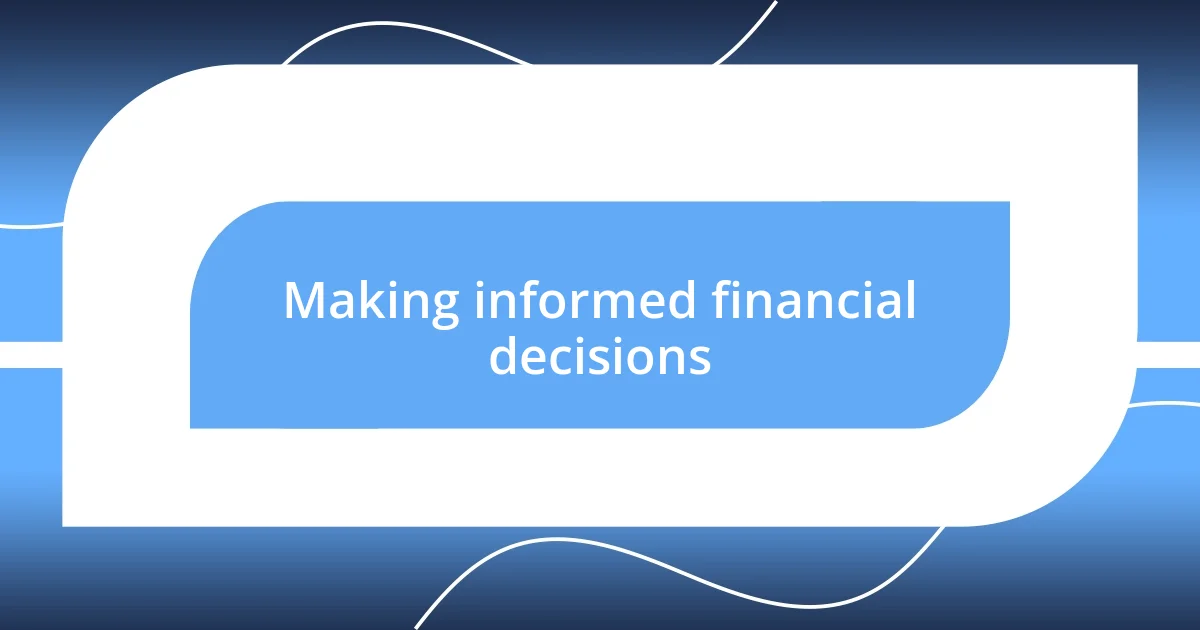
Making informed financial decisions
Making informed financial decisions requires a solid grasp of the changing landscape, especially in today’s climate of rising interest rates. I’ve found that staying educated on market trends and financial products is essential. For instance, when I was deciding on whether to refinance my mortgage, it was crucial to analyze my current rates against future projections. Have you ever felt overwhelmed by too much information? I recommend focusing on the key factors that truly impact your situation, which allows for clearer, more confident decision-making.
It’s also important to engage with financial professionals who can offer tailored advice. I remember consulting a financial advisor during a particularly confusing time. His insights not only clarified my options but also helped me understand how to leverage my assets strategically. This enhanced my confidence in choosing investments that aligned with my long-term goals. Have you considered enlisting help in your financial journey? Sometimes, an outside perspective is just what you need to turn uncertainty into action.
Additionally, practicing mindfulness around your financial choices can lead to better outcomes. I often reflect on my spending habits, especially how they shift when faced with economic changes. When interest rates spike, I find myself asking questions like, “Is this purchase crucial?” This self-reflection has transformed my approach from impulsive to intentional, allowing me to prioritize what truly matters. What about you? Have you taken the time to analyze your financial behavior and its alignment with your goals? The answers could lead to smarter decisions down the road.












